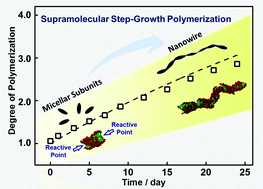Supramolecular step-growth polymerization kinetics of pre-assembled triblock copolymer micelles†
Abstract
The supramolecular polymerization of micelles and nanoparticles, drawing inspiration from the classic polymer science, provides an innovative concept to elucidate the organization of nanoscopic building units into one-dimensional hierarchical structures for wider applications in biotechnology and nanoscience. In contrast to the conventional molecular polymerization, the fundamental principles, especially the kinetics, of the supramolecular polymerization are rather less understood. Herein, capitalizing on the pre-assembled triblock copolymer micelles as prototypical systems, we propose a joint experimental-theoretical framework to probe into the mechanism and kinetics of the supramolecular polymerization. It is discovered that the self-assembly of micelles is induced by the structural defects where the core is partially exposed as a result of the imperfect coverage of the corona. The self-assembly of micelles reveals some similarities to molecular step-growth polymerization. A theoretical model of the supramolecular step-growth polymerization is proposed to complement the experimental results of defect-driven self-assembly kinetics, and reveals the essential distinction between the molecular and supramolecular polymerization kinetics. Furthermore, the kinetics and manner of self-assembly can be finely tuned by regulating the structural features of building units. These findings establish a quantitative framework for the supramolecular polymerization kinetics at the nanoscopic level that can aid in designing complex architectures and intrinsic properties of emerging materials.



 Please wait while we load your content...
Please wait while we load your content...